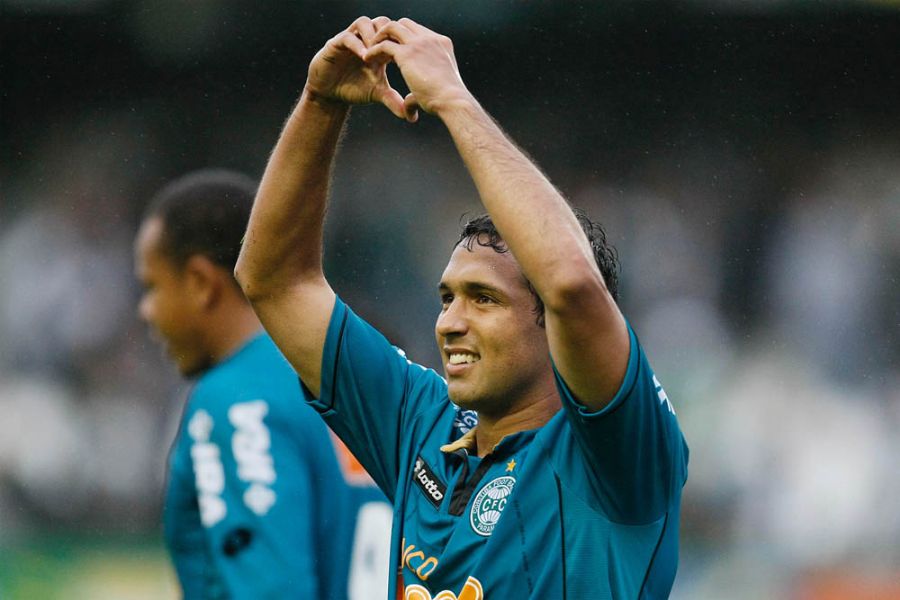As Editor for Sambafoot.com, it didn’t take me long to realise that Brazilians are everywhere in world football and China is no different. Last night for instance, Guangzhou Evergrande marked their AFC Champions League debut with a 5-1 away win over Jeonbuk, courtesy for three goals from Brazilians (Cléo x2 and Muriquí), plus another from an Argentine whose defining career moments came in the confines of the Campeonato Brasileiro – Darío Conca.
Looking at all of this year’s arrivals, it is clear that Chinese sides are looking at higher quality players than they have ever been able to in previous years. Across the board there are talented new imports, from the eye-catching signing of Nicolas Anelka at Shanghai Shenhua, to the lesser known, but considerable talents of Andrija Kaluderovic at Beijing Guo’an. With the imports from Brazil, it is no different. This year’s recruits are more respected and talented than ever, a massive coup for the Chinese Super League. Not only that, but each Chinese Super League club can only sign 4 non-Asian players – that means of the 64 slots available in the whole league, an impressive 26 have been filled with men from the land of samba.
The biggest Brazilian name to join the league is Fabio Rochemback at Dalian Aerbin. Rochemback, 30, formerly of Barcelona, Middlesbrough and Sporting Lisbon was until recently considered one of the best players in his defensive midfield position in Brazil and it was only with the return of Gilberto Silva to Brazil, as well as the rise of youngster Fernando that the star’s place in the first-team was no longer so assured. Anyone who remembers Rochemback from his spell in Europe will remember his thunderbolt free-kicks, whilst there is still an undeniable grace to his passing game in midfield.
As far as foreign players are concerned, Dalian Aerbin appear to have bought well. Brother of John, Peter Utaka, has been a prolific scorer across Europe in recent years; Mile Sterjovski is an Australian international midfielder of some repute; Lee Addy was until recently considered one of Ghana’s top defensive prospects, whilst most interesting is the signing of Gonzalo Canales from Universidad de Chile. After a journeyman career in which he scored regularly throughout, Canales was part of the all-conquering La U side of last season and will be a massive goal-threat if he can adapt quickly to life in China.
Whilst Aerbin bought the highest profile Brazilian player, it is undoubtedly fellow promoted side Guangzhou R&F who have done the best all-round business from Brazil. Four Brasucas have arrived in Guangdong for the new season, three of whom are of some repute. First-up is Davi (pictured), a 27-year-old attacking-midfielder from Coritiba. Not a star-name as such, (unlike last year’s ill-fated Beijing signing of the same title) Davi is well-respected in Brazil as a talented creative outlet and will undoubtedly add much quality to the R&F midfield. Joining him will be Jumar, a versatile defender or midfielder, formerly of Vasco. Jumar played a part in Vasco’s most successful season of recent years in 2011, appearing largely from the bench in either a centre-midfield or right-back position. A good tackler and fine passer, Jumar is one of the most eye-catching additions to the league this season.
In attack also, R&F have recruited very well. Leonardo has never been anything more than a journeyman striker, but in Rafael Coelho, Guangzhou’s second-side have a player potentially capable of something very special. A prolific scorer in his time at Figueirense, the 23-year-old made an unsuccessful step-up to Vasco da Gama at an early age, but recovered well to do well for Avaí last campaign, despite his side’s relegation. Given his age and talent, Rafael Coelho looks an inspired piece of business for the Cantonese side.
Hangzhou Greentown have also made some interesting incursions into the Brazilian market in the form of Mazola, Renatinho and Fabrício. All in their early twenties and all products of three of Brazil’s biggest clubs, these are the type of player who have in the past gone on to surprise people at home with their development. Traditionally Brazilians in China have been approaching the end of their career, but Hangzhou’s trio could be players to watch this campaign. Renatinho is the oldest at 24 and has previously enjoyed a good scoring spell in Japan with Kawasaki Frontale, Fabrício was only last year playing top-flight football in Portugal for Portimonense, whilst 22-year-old striker Mazola has enjoyed chequered scoring success to-date, but shown glimpses of quality.
Looking around the rest of the division, there are plenty more to keep an eye on. At relocated Shanghai Shenxin, midfielder Johnny will be joined by two exciting strikers. Until December, 31-year-old striker Anselmo was scoring goals with regularity in Brazil’s top-flight for Atlético Goianiense and will be a big threat to defences this year, whilst Antônio Flávio enjoyed a good spell on-loan in Brazil’s second-tier last season, having been moderately successful in a two year spell in Sweden. Expect the two to line-up in tandem, with Anselmo the more advanced of the pair.
Weldon, arriving at Changchun Yatai, Beijing Guo’an striker Reinaldo and Shanghai Shenhua’s new defender Moisés are all players who have played outside of Brazil for some years already and as such, it is hard to assess their current levels. Moisés is the most high-profile of the trio and should greatly strengthen the Shenhua back-line, whilst striker Weldon has played at a high level in both Brazil and Europe to good effect, suggesting Changchun have pulled off a coup with his signature. Reinaldo’s arrival at Guo’an is similar in many respects, with the 27-year-old striker having a good scoring history in Australia, the Middle-East and initially Brazil. Where Reinaldo offers a big advantage is with his Australian nationality, allowing his presence on the pitch alongside three other foreign players as the designated ‘Asian player’.
With the likes of Muriqui, Obina, Adriano and Paulão already waving the Brazilian flag high in China from last season and deciding to stay on for another campaign, the future looks ever brighter for those making the long trip from South America. Twenty-six Brazilians will take part in the Chinese Super League this campaign and as the financial pulling power of the clubs increase, there is little doubt it will become a more and more well-travelled route, in the same way Japan has been for Brazilians for nearly twenty years. It can only be hoped their presence will aid the development of domestic talent to a higher level than seen in recent years.




